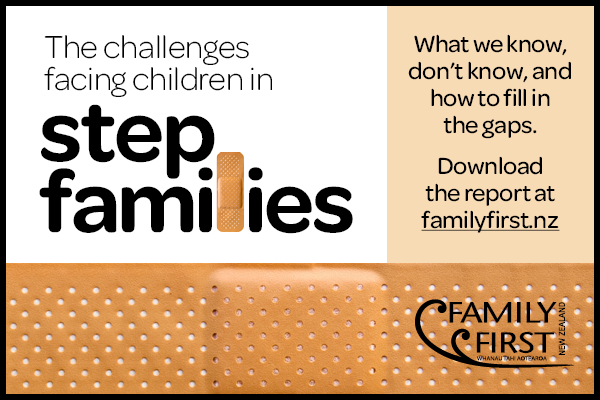New report says NZ needs better data on stepfamilies
Media Release 30 June 2020
 Many children’s lives today are marked by family turmoil. They live with parents who experience multiple relationship transitions leading to fractured family and friend networks, changes of neighbourhoods and schools. These children live with loss and torn loyalties which may affect them into adulthood. Yet, surprisingly little is known about the nature and parameters of the problem in New Zealand.
Many children’s lives today are marked by family turmoil. They live with parents who experience multiple relationship transitions leading to fractured family and friend networks, changes of neighbourhoods and schools. These children live with loss and torn loyalties which may affect them into adulthood. Yet, surprisingly little is known about the nature and parameters of the problem in New Zealand.
The Challenges Facing Children in Stepfamilies: What we know, don’t know, and how to fill the gaps – a new report from Family First – gathers together local and international research into the experiences and outcomes for children in stepfamilies. The greater the number of transitions experienced, the worse the child outcomes tend to be. These include greater risks of poor educational achievement, poverty, behavioural problems, anxiety, early exit from home, poor adult relationships and incarceration.
Whereas early last century stepfamilies generally formed through remarriage after the death of a spouse, today de facto or marriage dissolution, or an early unintended birth to a single mother and later partnering, are more likely pathways. Rates of multi partner fertility (MPF) – men and women having children with more than one partner – are increasing internationally.
Report author Lindsay Mitchell was however frustrated at the lack of New Zealand data. “Unlike other English-speaking nations New Zealand does not collect information about stepfamilies in the national Census. Surveys and longitudinal studies provide some data but that is comparatively sketchy and dated. Growing Up in New Zealand data shows that 17 percent of mothers experience 1-4 relationship transitions between pregnancy and when their child is 4.5 years. But this is an under-count due to sample attrition and methodology shortcomings.”
To this end the paper makes four recommendations about how to collect better data using existing surveys and longitudinal studies in order to substantially improve our knowledge.
“We hope that a Prime Minister and government that have prioritised making New Zealand the ‘best place in the world to raise children’ will adopt these recommendations. Understanding what is driving children’s well-being (or otherwise) is fundamental to any country’s future. If there are shortfalls that can be made up, or circumstances that can be avoided, we can only go forward from a position of knowledge.”






